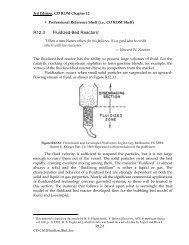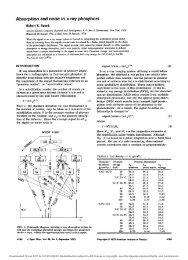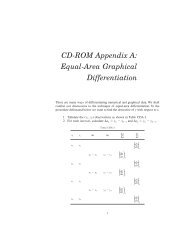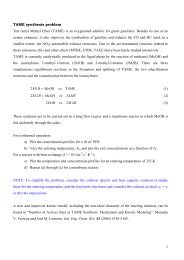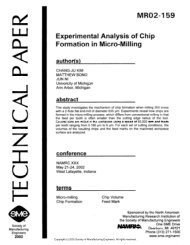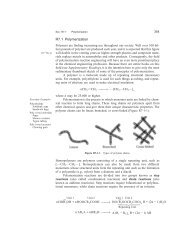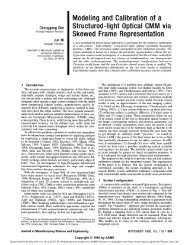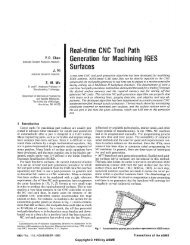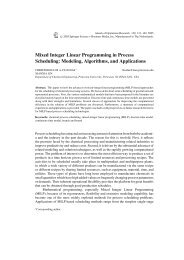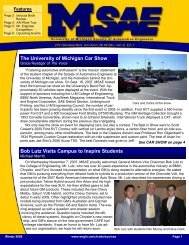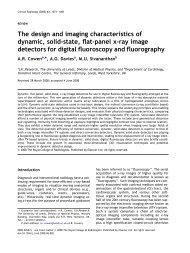Conceptual framework: What do you think is going on?
Conceptual framework: What do you think is going on?
Conceptual framework: What do you think is going on?
Create successful ePaper yourself
Turn your PDF publications into a flip-book with our unique Google optimized e-Paper software.
03-Maxwell.qxd 10/1/2004 3:13 PM Page 34<br />
34 QUALITATIVE RESEARCH DESIGN<br />
and identify potential validity threats to <str<strong>on</strong>g>you</str<strong>on</strong>g>r c<strong>on</strong>clusi<strong>on</strong>s. It also helps <str<strong>on</strong>g>you</str<strong>on</strong>g><br />
justify <str<strong>on</strong>g>you</str<strong>on</strong>g>r research, something I d<str<strong>on</strong>g>is</str<strong>on</strong>g>cuss in more detail in Chapter 7. In th<str<strong>on</strong>g>is</str<strong>on</strong>g><br />
chapter, I d<str<strong>on</strong>g>is</str<strong>on</strong>g>cuss the different sources for th<str<strong>on</strong>g>is</str<strong>on</strong>g> theory, and how to use theory<br />
effectively in <str<strong>on</strong>g>you</str<strong>on</strong>g>r design. I describe the nature of theory in more detail later<br />
in the chapter, in dealing with the uses of ex<str<strong>on</strong>g>is</str<strong>on</strong>g>ting theory. Here, I want to<br />
emphasize that <str<strong>on</strong>g>you</str<strong>on</strong>g>r c<strong>on</strong>ceptual <str<strong>on</strong>g>framework</str<strong>on</strong>g> <str<strong>on</strong>g>is</str<strong>on</strong>g> a theory, however tentative or<br />
incomplete it may be.<br />
<str<strong>on</strong>g>What</str<strong>on</strong>g> <str<strong>on</strong>g>is</str<strong>on</strong>g> often called the “research problem” <str<strong>on</strong>g>is</str<strong>on</strong>g> a part of <str<strong>on</strong>g>you</str<strong>on</strong>g>r c<strong>on</strong>ceptual<br />
<str<strong>on</strong>g>framework</str<strong>on</strong>g>, and formulating the research problem <str<strong>on</strong>g>is</str<strong>on</strong>g> often seen as a key task<br />
in designing <str<strong>on</strong>g>you</str<strong>on</strong>g>r study. It <str<strong>on</strong>g>is</str<strong>on</strong>g> part of <str<strong>on</strong>g>you</str<strong>on</strong>g>r c<strong>on</strong>ceptual <str<strong>on</strong>g>framework</str<strong>on</strong>g> (although it<br />
<str<strong>on</strong>g>is</str<strong>on</strong>g> often treated as a separate comp<strong>on</strong>ent of a research design) because it<br />
identifies something that <str<strong>on</strong>g>is</str<strong>on</strong>g> <str<strong>on</strong>g>going</str<strong>on</strong>g> <strong>on</strong> in the world, something that <str<strong>on</strong>g>is</str<strong>on</strong>g> itself<br />
problematic or that has c<strong>on</strong>sequences that are problematic. Your research<br />
problem functi<strong>on</strong>s (in combinati<strong>on</strong> with <str<strong>on</strong>g>you</str<strong>on</strong>g>r goals) to justify <str<strong>on</strong>g>you</str<strong>on</strong>g>r study, to<br />
show people why <str<strong>on</strong>g>you</str<strong>on</strong>g>r research <str<strong>on</strong>g>is</str<strong>on</strong>g> important. In additi<strong>on</strong>, th<str<strong>on</strong>g>is</str<strong>on</strong>g> problem <str<strong>on</strong>g>is</str<strong>on</strong>g><br />
something that <str<strong>on</strong>g>is</str<strong>on</strong>g> not fully understood, or that we <str<strong>on</strong>g>do</str<strong>on</strong>g>n’t adequately know<br />
how to deal with, and therefore we want more informati<strong>on</strong> about it. Not<br />
every study will have an explicit statement of a research problem, but every<br />
worthwhile research design c<strong>on</strong>tains an implicit or explicit identificati<strong>on</strong> of<br />
some <str<strong>on</strong>g>is</str<strong>on</strong>g>sue or problem, intellectual or practical, about which more informati<strong>on</strong><br />
<str<strong>on</strong>g>is</str<strong>on</strong>g> needed. (The justificati<strong>on</strong> of “needed” <str<strong>on</strong>g>is</str<strong>on</strong>g> where <str<strong>on</strong>g>you</str<strong>on</strong>g>r goals come into<br />
play.)<br />
Many writers label the part of a research design, proposal, or publ<str<strong>on</strong>g>is</str<strong>on</strong>g>hed<br />
paper that deals with the c<strong>on</strong>ceptual <str<strong>on</strong>g>framework</str<strong>on</strong>g> of a study the “literature<br />
review.” Th<str<strong>on</strong>g>is</str<strong>on</strong>g> can be a dangerously m<str<strong>on</strong>g>is</str<strong>on</strong>g>leading term. In developing <str<strong>on</strong>g>you</str<strong>on</strong>g>r c<strong>on</strong>ceptual<br />
<str<strong>on</strong>g>framework</str<strong>on</strong>g>, <str<strong>on</strong>g>you</str<strong>on</strong>g> should not simply summarize some body of theoretical<br />
or empirical publicati<strong>on</strong>s, for three reas<strong>on</strong>s:<br />
1. It can lead to a narrow focus <strong>on</strong> “the literature,” ignoring other c<strong>on</strong>ceptual<br />
resources that may be of equal or greater importance for <str<strong>on</strong>g>you</str<strong>on</strong>g>r study. As<br />
Locke, Spirduso, and Silverman (1993) pointed out, “in any active area of<br />
inquiry the current knowledge base <str<strong>on</strong>g>is</str<strong>on</strong>g> not in the library—it <str<strong>on</strong>g>is</str<strong>on</strong>g> in the inv<str<strong>on</strong>g>is</str<strong>on</strong>g>ible<br />
college of informal associati<strong>on</strong>s am<strong>on</strong>g research workers” (p. 48). Th<str<strong>on</strong>g>is</str<strong>on</strong>g> knowledge<br />
can be found in unpubl<str<strong>on</strong>g>is</str<strong>on</strong>g>hed papers, d<str<strong>on</strong>g>is</str<strong>on</strong>g>sertati<strong>on</strong>s in progress, and grant<br />
applicati<strong>on</strong>s, as well as in the heads of researchers working in th<str<strong>on</strong>g>is</str<strong>on</strong>g> field. Locke<br />
et al. (1993) stated that “the best introducti<strong>on</strong> to the current status of a research<br />
area <str<strong>on</strong>g>is</str<strong>on</strong>g> close associati<strong>on</strong> with adv<str<strong>on</strong>g>is</str<strong>on</strong>g>ors who know the territory” (p. 49). In additi<strong>on</strong>,<br />
an exclusive orientati<strong>on</strong> toward “the literature” leads <str<strong>on</strong>g>you</str<strong>on</strong>g> to ignore <str<strong>on</strong>g>you</str<strong>on</strong>g>r<br />
own experience, <str<strong>on</strong>g>you</str<strong>on</strong>g>r speculative <str<strong>on</strong>g>think</str<strong>on</strong>g>ing (d<str<strong>on</strong>g>is</str<strong>on</strong>g>cussed below in the secti<strong>on</strong> titled<br />
“Thought Experiments”), and any pilot and exploratory research that <str<strong>on</strong>g>you</str<strong>on</strong>g>’ve<br />
<str<strong>on</strong>g>do</str<strong>on</strong>g>ne.




